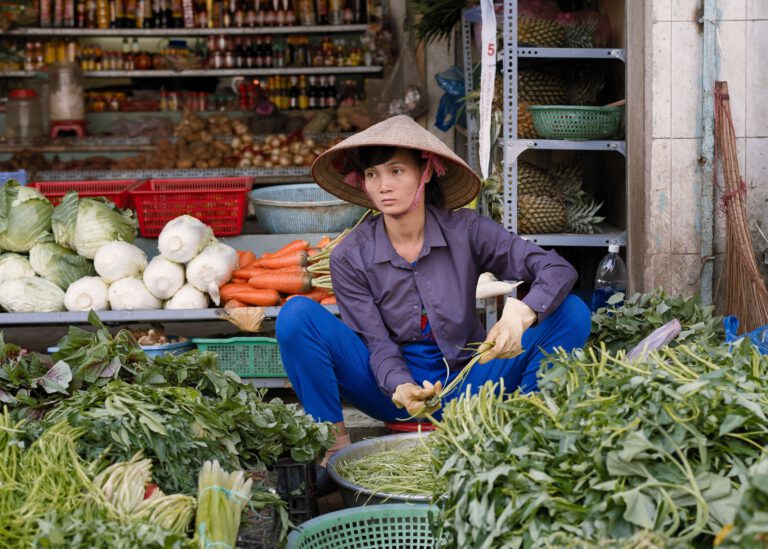This website uses cookies so that we can provide you with the best user experience possible. Cookie information is stored in your browser and performs functions such as recognising you when you return to our website and helping our team to understand which sections of the website you find most interesting and useful.
world tourism day
Developing More Sustainable Food Tourism

World Tourism day - rethinking tourism
Every year on September 27th the World Tourism Day is celebrated. The day was established in 1980 by the World Tourism Organization (UNWTO). Its purpose is to promote the value of tourism (BMUV, 2022).
Every year the day has a new theme. This year it is ‘Rethinking Tourism’, referring to the still lasting crisis. Restarting the tourism industry is certainly challenging. However, it actually presents a great opportunity for improving tourism and making it more sustainable (Pratama, 2022). Tourism can have a big negative impact on the environment. This reaches from pollution and erosions to endangered species and overall, an enormous ecological footprint (The World Counts, n.d.).
rethinking food tourism on World Tourism Day
The World Tourism Day should not only inspire tourists but also locals to deal with tourism more sustainably (Pratama, 2022). Not only to treat the planet better but also to comply with the strengthened consumer interest in sustainability, food and tourism suppliers should rethink their (food) tourism products (Bertella, 2020).
consumer care about sustainable tourism
In line with that, in a recent study by Tourlane, sustainability was rated as most important to respondents from 18 to 24 years. 39% of the respondents appreciate sustainability when booking their holidays. Also, 49% of the travellers who value sustainability are more likely to choose local accommodations (49%) and prefer destinations that support sustainable initiatives (45%) (Tourlane, 2022). This shows that tourists should also get the chance to behave more sustainable while travelling.
developing sustainable food tourism
As a niche market in tourism, food tourism also can have many negative impacts on the environment like the loss of biological diversity or the destruction of the ozone layer due to carbon emissions, especially from transportation matters. But there are many possibilities in food tourism to design tourism as sustainable as possible for every party involved. Food (tourism) suppliers can make use of the following tips on how to make food tourism more sustainable.
1. Be local
Offer food that is not only made out of ingredients that are both seasonal and regional, but make sure they actually are local food that has its history at the place. The best option for that is, to produce and consume the food where it is also grown (ecotourism world, 2020). Buschenschanken in Austria for example only sell products that have been grown and produced at their own location (Weingut Buschenschank, n.d.).
2. Become awarded with Michelin Green stars
A Michelin Green Star does not only award outstanding cooking but also the ethical and sustainable practices behind the meal. The judges take a closer look at sustainable food experiences around the production of the food. Restaurants are therefore graded upon their sustainable practices, considering things like the ingredients, the environmental footprint, resource management and sustainable communication to the guests (Michelin Guide, 2021).
3. Say no to single use plastics
4. Respect local people
To be as sustainable but also authentic as possible as a supplier, restaurants should be run by local people that can actually tell more about the history of the food and make a story around it. This helps the tourists to value the food even more, especially when employees communicate the feeling of authenticity (Ha, 2022). One example for this is Blue Nile in Munich. Guests describe their visit as an authentic experience due to the staff, the food and the overall environment (Tripadvisor, 2022).
5. The Travelling Spoon
The Travelling Spoon is a website which gives local hosts with homemade food the possibility to become visible. The website helps tourist to become more aware on what places pass traditions in their food to experience authentic food (The travelling spoon, n.d.).
summing up world tourism day 2022
Overall, food tourism suppliers can contribute to a long-term sustainability by respecting all parties involved. Food tourism can pave the perfect way to greener tourism generally and greatly contributes to sustainable tourism. It is important that sustainability is always being considered in food tourism, not only by tourists but also by suppliers and restaurants. That way, more people become active in sustainable food tourism and educate each other on the topic (Emily, 2021). The World Tourism Day reminds us to rethink tourism in all niche markets and to make small steps in contributing towards a more sustainable tourism industry.
Laureen Rashof & Sarah Terborg, 27.09.2022
Sources
Bertella, G. (2020). Re-thinking sustainability and food in tourism. Retrieved from https://www.ncbi.nlm.nih.gov/pmc/articles/PMC7375275/
Bundesministerium für Umwelt, Naturschutz, nukleare Sicherheit und Verbrauerschutz (BMUV). (2022). Welttourismustag. [World Tourism Day]. Retrieved from https://www.bmuv.de/service/veranstaltungen/veranstaltung/welttourismustag
Ecotourism World (2020). Gastronomy tourism in a sustainable way. Retrieved from https://ecotourism-world.com/gastronomy-tourism-in-a-sustainable-way/
Emily (n.d.). Sustainable food tourism. Retrieved from https://seasidewithemily.com/sustainable-food-tourism/
Ha, M. A. (2022). Food tourism is the perfect entrée for greener travel. Retrieved from https://skift.com/2022/04/22/food-tourism-is-the-perfect-entree-for-greener-travel/
Michelin Guide (2021). What is a michelin green star? Retrieved from https://guide.michelin.com/kr/en/article/features/what-is-a-michelin-green-star-kr
Pratama, M. J. (2022). Celebrating World Tourism Day 2022. Retrieved from https://www.halaltrip.com/other/blog/celebrating-world-tourism-day/ :
Rinkesh (n.d.). 13+ Ultimate ways to promote sustainable tourism. Retrieved from https://www.conserve-energy-future.com/ways-promote-sustainable-tourism.php
The travelling spoon (n.d.). Company info. Retrieved from https://www.travelingspoon.com/about
The World Counts (n.d.). 45 arrivals every second. Retrieved from https://www.theworldcounts.com/challenges/consumption/transport-and-tourism/negative-environmental-impacts-of-tourism
Tourlane. (2022). “Rethink tourism” am Welttourismustag. ‘Rethink tourism’ on the World Tourism Day. Retrieved from https://www.deutscherpresseindex.de/2022/09/26/rethink-tourism-am-welttourismustag/
Tripadvisor (2022). Blue nile. Retrieved from https://www.tripadvisor.de/Restaurant_Review-g187309-d742667-Reviews-Blue_Nile-Munich_Upper_Bavaria_Bavaria.html
Weingut Buschenschank (n.d.). Der Buschenschank. [The Buschenschank]. Retrieved from http://www.buschenschank-dietrich.at/der-buschenschank/
